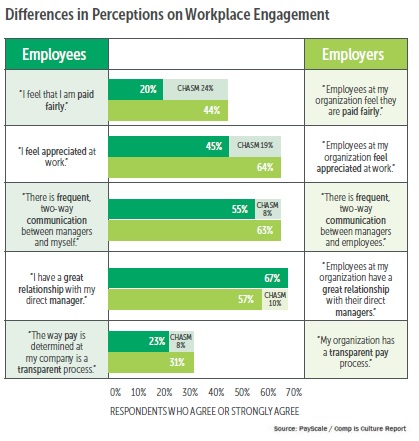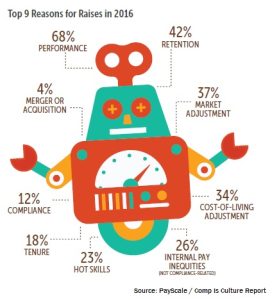These days, it seems like more and more companies are thinking about their corporate culture. A good culture is viewed as a solid strategy for driving job satisfaction and – ultimately – attracting and retaining the best and brightest employees in our increasingly competitive talent market.
So what does culture have to do with compensation? Turns out, just about everything.
Compensation practices are really where the rubber meets the road, so to speak. Consider a company that has a large marquee in their lobby proclaiming, “Our people are our greatest asset.” If that company then pays in the lowest 10% of their talent market’s value, are they really living their culture? Likewise, if a company lists the core value of “work life balance” on their career website, does their paid time off (PTO) policy support that value?
Whether companies realize it or not, their compensation policies already underscore cultural pillars and either make them a reality – or not.
Comp fairness disconnect
A recent Gallup poll showed that 64% of employees are not engaged in their work. We believe there is a correlation between employee engagement and how valued an employee feels at work. The failure to link compensation to culture is one reason why so many companies are struggling with a crisis of employee disengagement. Our latest Compensation Best Practice’s Report revealed that while 44% of companies think their employees are fairly paid, only 20% of employees said they fee that way. That’s a staggering disconnect on how fairness is perceived. Now, layer on another insight from the study: 64% of companies said their employees felt appreciated at work, while only 45% of employees agreed with that same statement. We call this disparity in how an employer and employee feels about value and appreciation “The Corporate Chasm.”
Pay transparency
So, how do companies address this chasm and ensure employees understand they’re doing the right things when it comes to pay, and show that they really do value their employees? The answer is communication. It’s not enough to pay employees fairly, employers also need to also tell them about the company’s pay policies and how pay was determined.
At PayScale, we have been part of the emerging conversation on pay transparency for several years now. From Hollywood to Silicon Valley, and from healthcare to manufacturing, there are many stories highlighting the lack of trust caused by unfair pay practices (real or perceived). Transparency is emerging as a powerful antidote to this eroded trust in the workplace and we believe this trend will continue.
Of course, increased transparency requires a commitment from the executive suite. 57% of this year’s survey respondents agreed that compensation is becoming more important to their executives, a trend that bodes well for transparency. An effective dialogue around pay transparency also requires confidence in the market data used to inform compensation decisions, so managers can have compensation conversations that are based in fact. Employees want to know that talent data is sourced carefully and that it’s accurate.
 Many companies go through a painstaking process of building market-based pay structures for every position at the company. Yet, few companies explain how their pay structure was established and where employees fit into the overall structure. This is where an open, honest and informed discussion with employees can address the corporate chasm and get employees and employers on the same page. Think of a company that truly values people and is paying in the 70th percentile of the market for most jobs, but doesn’t talk about pay with employees. The company will not get credit for ‘paying up’ in the market unless their managers share the information with employees and discuss how they are paid relative to market value.
Many companies go through a painstaking process of building market-based pay structures for every position at the company. Yet, few companies explain how their pay structure was established and where employees fit into the overall structure. This is where an open, honest and informed discussion with employees can address the corporate chasm and get employees and employers on the same page. Think of a company that truly values people and is paying in the 70th percentile of the market for most jobs, but doesn’t talk about pay with employees. The company will not get credit for ‘paying up’ in the market unless their managers share the information with employees and discuss how they are paid relative to market value.
The good news is that many companies are moving in the right direction to improve engagement with employees. For example, the study shows companies are planning to become more transparent about compensation policies than ever before. Managers should aim to understand the impact of the corporate chasm at their own company. Once employers understand this disconnect in terms of each employees’ perceived value, then they can explore how compensation can make their corporate culture a reality.
